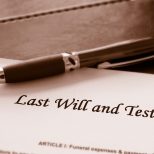
Paying Inheritance Tax – what you need to know.
4th May 2022 by Kate Mansfield
For those dealing with someone’s estate after their death, the Inheritance Tax bill can come as a nasty shock. It needs to be paid before a Grant of Probate or Letters of Administration are applied for, which can sometimes create difficulties.
The current Inheritance Tax threshold is £325,000, meaning that where more than this sum is left in an estate, Inheritance Tax will need to be paid on the amount in excess of the threshold at the rate of 40%. There are some exceptions to this, for example, where an individual leaves everything to their spouse or civil partner, no Inheritance Tax is payable. When the spouse or civil partner dies, their estate can also benefit from any unused Inheritance Tax allowance from the estate of the first to die.
How to calculate Inheritance Tax
Inheritance Tax calculations can be complex. The estate’s personal representative will need to value the deceased’s estate and also identify any gifts of value that the deceased made in the seven years before their death. Where the estate is liable for Inheritance Tax, tax is payable on some gifts of cash or items of value on a sliding scale, available on the government’s website.
All items of value will need to be included in the estate valuation, such as property, cars, jewellery, art, shares, Premium Bonds and investments. Their value as at the date of death should be listed on the HM Revenue & Customs (HMRC) forms. You can obtain professional valuations for some chattels, such as art or jewellery. For other assets such as property or cars, you may be able to obtain a figure by looking at the sale price of similar items.
Where there is an unused Inheritance Tax allowance, this can be applied against the gross value of the estate along with the deceased’s own allowance.
There is also an allowance in respect of the deceased’s residence, if this is left to direct descendants such as children or grandchildren. This is in the sum of £175,000. Again, if this was not used by the deceased’s late spouse or civil partner, the unused allowance can be put against the deceased’s estate.
Where the deceased left 10% or more of their estate to charity, their Inheritance Tax rate will drop to 36%.
When is Inheritance Tax payable?
Inheritance Tax should be paid at least fifteen working days before an application for a Grant is made to the Probate Registry. Before Inheritance Tax can be paid, you need to ask HMRC for an Inheritance Tax reference number. It will take them up to three weeks to issue this.
Once the reference number has been received, it can be used to pay the Inheritance Tax. A number of forms will also need to be sent to HMRC at the same time, giving full details of the deceased’s estate.
There is a deadline for payment of Inheritance Tax of the end of the sixth month after the person died. If this is not met, then HMRC will charge interest.
How to fund an Inheritance Tax payment
Most people do not have enough available cash to cover an Inheritance Tax bill, which can potentially cause difficulties as investment companies will not generally release funds until they have been given a Grant of Probate or Letters of Administration. In turn, the Grant will not be issued until Inheritance Tax has been paid.
There are a number of ways around this. Firstly, if the deceased held money in a bank or building society account, it may be possible to ask them to release funds to HMRC to pay the Inheritance Tax directly. British government stock can also be used to pay Inheritance Tax.
In some cases, it is possible to pay Inheritance Tax in equal annual instalments over a period of ten years. This is only an option where the estate includes something that would take some time to sell, such as a property or shares. Interest will generally be payable on the outstanding amount and you will be required to clear the Inheritance Tax bill in full once the assets have been sold.
This can also be used if you are intending not to sell a house because you wish to keep it and live in it yourself.
Dealing with Inheritance Tax can be complex and it is generally recommended that you seek legal advice to ensure that your calculations are correct and that the accompanying forms include all necessary information.
If you would like any further information regarding Inheritance Tax and Tax Planning please contact Kate Mansfield or a member of our team on 01202 377800.



